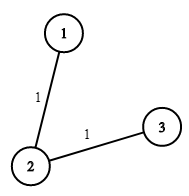There are n houses in a village. We want to supply water for all the houses by building wells and laying pipes.
For each house i, we can either build a well inside it directly with cost wells[i], or pipe in water from another well to it. The costs to lay pipes between houses are given by the array pipes, where each pipes[i] = [house1, house2, cost] represents the cost to connect house1 and house2 together using a pipe. Connections are bidirectional.
Find the minimum total cost to supply water to all houses.
Example 1:
Input: n = 3, wells = [1,2,2], pipes = [[1,2,1],[2,3,1]] Output: 3 Explanation: The image shows the costs of connecting houses using pipes. The best strategy is to build a well in the first house with cost 1 and connect the other houses to it with cost 2 so the total cost is 3.
Constraints:
1 <= n <= 10000wells.length == n0 <= wells[i] <= 10^51 <= pipes.length <= 100001 <= pipes[i][0], pipes[i][1] <= n0 <= pipes[i][2] <= 10^5pipes[i][0] != pipes[i][1]
[Union Find] [Graph] [Minimum Spanning Tree]
